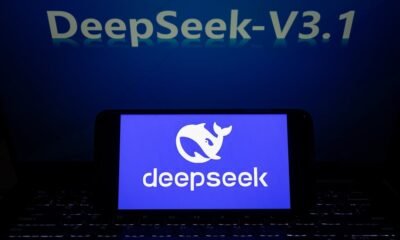Jobs & Careers
Apexon Launches Agentic AI Platform ‘AgentRise’ for Intelligent Enterprises

Apexon, a digital technology services & platform solutions company, has launched AgentRise, a platform that streamlines the transition to AI-native operations by integrating Agentic AI into business functions and decision-making processes. It offers context-aware AI agents tailored for specific industrial processes and embedded within the organisation’s core operations.
AgentRise is a modular, enterprise-ready solution that integrates Apexon’s proprietary intelligence models, decision frameworks, and reusable assets with trusted third-party technologies.
It includes accelerators to speed up time-to-value and safeguards for security and responsible AI use, providing a solid foundation for organisations to implement agent-driven operations that boost growth and efficiency.
In an exclusive conversation with AIM, Mukund Kalmanker, the global head of data, analytics, and AI at Apexon, elaborated, “Agentic AI Brain integrates LLMs for inference and actioning, manages orchestration between agents, and serves as the foundation for this holistic platform. This Agentic Brain is supported by what we call the agent compliance, validation, and governance framework.”
He added, “Once you look at this at the core, you’ll see we’ve created interfaces referred to as agent interfaces and a supporting ecosystem called the agent ecosystem. This includes model context protocol (MCP) servers, agent registries, and we’ve been very quick in incorporating all major market releases into our platform at lightning speed.”
Designed for continuous development, AgentRise enables businesses to incorporate autonomous agents into their workflows, resulting in measurable improvements, such as up to a 40% reduction in processing time and a 30% decrease in workloads.
AgentRise supports the adoption of Agentic AI through two main pillars: Agentic Readiness, which focuses on secure AI foundations using governance frameworks and clean data, and Adoption at Scale, which involves identifying impactful use cases and redesigning workflows for effective collaboration with AI agents.
“Our approach ensures that agentic implementations are solid both at the model level and during execution. Since we work closely with regulated industries, we don’t expect fully autonomous environments yet. For example, with one client, we’re helping them understand how to use system thresholds to manage transactions. Some low-risk transactions can be processed autonomously, while others are routed to humans,” Kalmanker highlighted.
He added that goal alignment and hallucinations can be examined through two main aspects: the model level, which requires specific guardrails, and the agentic frameworks aimed at achieving goals.
A five-point guardrail framework has been created, covering domain adherence to keep agents within their scope, governance of learning for managing datasets, safety to prevent misuse, responsibility to tackle ethics and bias, and compliance with relevant regulations. This approach ensures effective management of hallucinations, responsible AI adoption, and output trustworthiness at the platform level, Kalmanker said.
“On top of that, because agentic systems can autonomously iterate toward goals, we’ve established a validation framework. It’s a ten-point strategy, including components like an agent jury,” he concluded.
Jobs & Careers
Reliance’s Jio Haptik Rolls Out AI Agents for Small Businesses at ₹10,000

Reliance’s Jio Haptik has introduced enterprise-grade AI agents for small and medium businesses (SMBs) in India, priced at ₹10,000 for 2,000 conversations. The service offers WhatsApp and voice-based AI features to automate business processes, including customer support, bookings and lead qualification.
According to the company, the per-conversation cost ranges from ₹3 to ₹5, nearly half the cost of a human agent. “Early adopters are already seeing up to 80% of their repetitive customer support queries resolved automatically, along with a 20-25% increase in lead-to-sale conversions,” Ahshad Jussawalla, CEO of Haptik, said.
The AI agents meet enterprise-grade compliance and security standards, support 22 Indian languages and are aimed at businesses such as small clinics, e
Jobs & Careers
Apple Plans AI Search Tool Powered by Google Gemini, Leaves Perplexity Out

Apple is preparing to launch an AI-based web search service next year, stepping up competition with OpenAI and Perplexity AI, Bloomberg reported. The system, internally known as World Knowledge Answers, will be integrated with Siri and could later expand to Safari and Spotlight.
The new feature, described by Apple executives as an answer engine, is expected to arrive next Spring as part of a broader Siri overhaul. “The work we’ve done on this end-to-end revamp of Siri has given us the results we needed,” Craig Federighi, head of software engineering at Apple, reportedly told employees in a recent all-hands meeting.
The update will enable Siri to handle more complex queries by tapping LLMs. Apple is testing models from Google and Anthropic, while continuing to use its own Apple Foundation Models for on-device search.
According to Bloomberg, Apple has leaned towards Google’s Gemini for summarisation, citing more favourable financial terms after Anthropic sought over $1.5 billion annually for its Claude model.
The overhaul, internally codenamed Linwood and LLM Siri, will allow the assistant to summarise web results using text, images, videos and local information. Apple is also working on a visual redesign of Siri and a health-focused AI agent, slated for release in 2026.
The initiative comes as Apple maintains its $20 billion-a-year search arrangement with Google. A US judge this week ruled the deal can continue with minor adjustments, easing investor concerns.
Google’s market cap rose by about $228 billion on September 4, closing at a record high of $2.79 trillion.
However, Apple’s SVP of services, Eddy Cue, recently testified that Google searches from Apple devices have declined for the first time in two decades, noting the rise of “formidable competitors” in AI-powered search.
While Apple explored acquisitions of startups such as Perplexity and Mistral, it has opted to develop its own system. Bloomberg reported that Perplexity’s technology was seriously evaluated, but the company is no longer pursuing a deal.
Despite the push, Apple’s AI division has faced attrition. Key members of its Foundation Models team, including founder Ruoming Pang, have left for rivals like Meta, OpenAI and Anthropic.
The post Apple Plans AI Search Tool Powered by Google Gemini, Leaves Perplexity Out appeared first on Analytics India Magazine.
Jobs & Careers
Indian AI Startup Seekho Raises $28 Mn in Series B Led by Bessemer Venture Partners

Short-video learning platform Seekho has raised $28 million in a Series B funding round led by Bessemer Venture Partners, with participation from Goodwater Capital and existing investors Lightspeed India and Elevation Capital, the company announced in a LinkedIn post.
Founded as a mobile-first edtech startup, Seekho offers more than 10,000 bite-sized learning videos in Hindi, Tamil and Telugu. Its platform focuses on making knowledge accessible through short, regional-language videos that cover skills for work and everyday digital literacy.
The company said the new funding will support its push into AI-powered personalisation and international expansion.
“With this funding, we’re leveraging AI to craft personalised learning journeys for every user and building a global learning brand that is Made in India,” Seekho said in a statement.
Elluminate Capital acted as the exclusive financial advisor to Seekho for the round.
Founded in 2020 by Choudhary, Keertay Agarwal and Yash Banwani, Bengaluru-based Seekho runs a short-video learning platform offering vernacular content across career, business and self-improvement categories. The company says it has 25 million monthly active users, with usage growing 60% each quarter.
“Learning should be relevant, bite-sized, and accessible in the palm of your hand. With Bessemer joining us, we’re excited to build a category-defining product that puts ‘Edutainment on Tap’ for the next 500 million Indians,” said Rohit Choudhary, founder of Seekho.
Seekho attributed its subscription growth to increasing consumer readiness to pay for digital content and wider adoption of UPI autopay. The company estimates it can capture a substantial share of India’s $2.5 billion subscription market.
For FY24, Seekho reported revenue of ₹11.5 crore and a loss of ₹4.6 crore. Financial results for FY25 are yet to be disclosed.
The post Indian AI Startup Seekho Raises $28 Mn in Series B Led by Bessemer Venture Partners appeared first on Analytics India Magazine.
-

 Business6 days ago
Business6 days agoThe Guardian view on Trump and the Fed: independence is no substitute for accountability | Editorial
-
Tools & Platforms3 weeks ago
Building Trust in Military AI Starts with Opening the Black Box – War on the Rocks
-

 Ethics & Policy1 month ago
Ethics & Policy1 month agoSDAIA Supports Saudi Arabia’s Leadership in Shaping Global AI Ethics, Policy, and Research – وكالة الأنباء السعودية
-

 Events & Conferences4 months ago
Events & Conferences4 months agoJourney to 1000 models: Scaling Instagram’s recommendation system
-

 Jobs & Careers2 months ago
Jobs & Careers2 months agoMumbai-based Perplexity Alternative Has 60k+ Users Without Funding
-

 Education2 months ago
Education2 months agoVEX Robotics launches AI-powered classroom robotics system
-

 Funding & Business2 months ago
Funding & Business2 months agoKayak and Expedia race to build AI travel agents that turn social posts into itineraries
-

 Podcasts & Talks2 months ago
Podcasts & Talks2 months agoHappy 4th of July! 🎆 Made with Veo 3 in Gemini
-

 Podcasts & Talks2 months ago
Podcasts & Talks2 months agoOpenAI 🤝 @teamganassi
-

 Education2 months ago
Education2 months agoAERDF highlights the latest PreK-12 discoveries and inventions



















